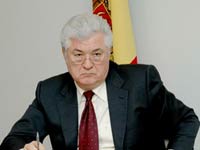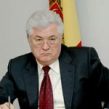
VORONIN REQUESTS NATO IPAP, WESTERN SUPPORT TO RESOLVE TRANSNISTRIA
Publication: Eurasia Daily Monitor Volume: 2 Issue: 112
By:

On June 7 in Brussels, Moldovan President Vladimir Voronin addressed the North Atlantic Council (NAC, the main decision-making body of NATO) in ambassadorial session, as part of NATO-Moldova consultations within the Partnership for Peace (PfP) program. It was the first-ever official visit by a Moldovan president at NATO headquarters. Voronin handed to NATO Secretary-General Jaap de Hoop Scheffer and to NAC a Moldovan proposal to advance from PfP to a deeper and closer relationship, an Individual Partnership Plan (IPAP) between Moldova and NATO.
In his speech to NAC, Voronin stated, “Despite an unfavorable geopolitical context, Moldova places a major stake on developing its relations with NATO and feels encouraged by the alliance’s open-door policy.” He declared Moldova’s goal of “joining a common security system in the Euro-Atlantic space” — a formulation that constitutes Moldova’s ultimate farewell to the “post-Soviet space.” Voronin also requested NATO assistance to advance the interoperability of selected Moldovan military units with NATO forces.
Pointing to the “unlawful presence of Russia’s troops on Moldova’s territory,” Voronin asked for NATO’s political support to achieve the “undelayed, unconditional, complete withdrawal of Russian troops from Moldova.” He noted that the [Russia-dominated] “five-sided” format for negotiations on Transnistria and the [Russian-led] “peacekeeping” operation have long demonstrated their uselessness, “blocking the resolution of the conflict, which only serves to consolidate the separatist regime and to advance foreign geopolitical interests as well as those of organized crime.” Consequently, Voronin called for the United States, the European Union, and Romania to be included alongside Russia, Ukraine, and the OSCE in the negotiating format; and for replacement of the existing Russian “peacekeeping” operation with an international, predominantly civilian mission of observers that should include the United States, EU, OSCE, and Ukraine among the participants.
In his meting with de Hoop Scheffer, Voronin inquired about possible technical and financial assistance from NATO for the evacuation or scrapping of Russian ammunition stockpiles in Transnistria and withdrawal of Russian military equipment and troops. In the NAC session, member countries’ ambassadors reaffirmed the alliance’s position that the governments would not move to ratify the Treaty on Conventional Forces in Europe until Russia withdraws its forces from Moldova “unconditionally and completely.”
On the same day in Brussels, Voronin met with the EU’s High Representative for the Common Foreign and Security Policy, Javier Solana, and other senior EU officials. Voronin handed over to Solana a letter, signed on June 2 jointly by Voronin and Ukrainian President Viktor Yushchenko. Addressed to European Commission President Jose Manuel Barroso and to Solana, the letter requests the EU to support the creation of effective border monitoring and customs arrangements on the Transnistria sector of the Moldova-Ukraine border. Such arrangements could, if effectively implemented, stop the massive smuggling that sustains Transnistria’s authorities and has turned that border into Europe’s “black hole.”
Speaking to the European Parliament in Strasbourg on June 8, Voronin termed “European integration as Moldova’s irreversible choice and top-priority goal.” He reported on the Moldovan parliament’s first steps to enact the legislative agenda of the EU-Moldova Action Plan, signed in February of this year. The parliamentary partnership, created in the wake of the recent elections by Voronin’s nominally Communist Party with the right-wing Christian-Democrat and Social-Liberal parties, is facilitating the smooth adoption of legislation required by the Action Plan.
Characterizing the goal of reunification with Transnistria as “unquestionably the basic prerequisite to the existence of Moldovan statehood,” Voronin found words of praise for the Ukrainian plan to settle the Transnistria conflict, expressed gratitude to the plan’s nominal author Yushchenko, but also pointed to the plan’s flaws, mainly of omission. The Ukrainian plan was a major topic of discussion during Voronin’s visits to NATO and EU in Brussels as well. The Moldovan parliament is about to issue a set of documents assessing this plan and proposing major corrections.
(Moldpres, June 7, 8, 9)




